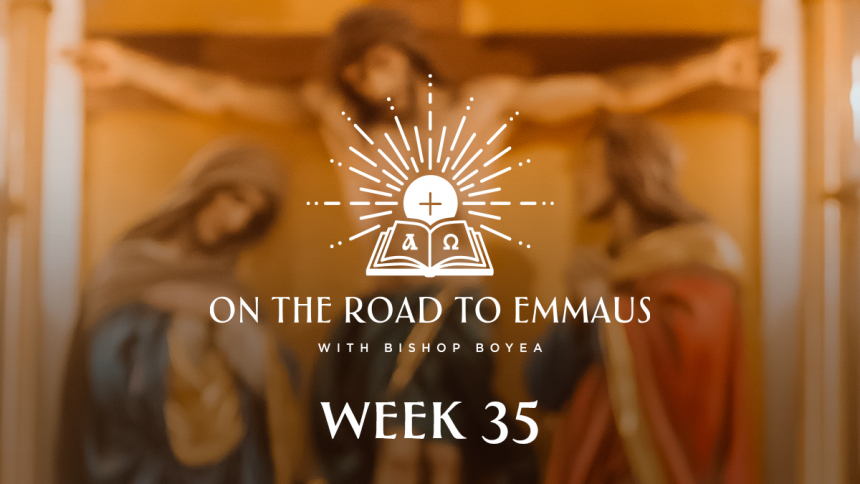
Friday, February 9, 2024
Friday of the Fifth Week of Ordinary Time
Dear brothers and sisters in Christ,
This is my body! This is my blood! This week On the Road to Emmaus, our year-long pilgrimage through the Holy Mass, we reach the very heart of the Eucharistic Prayer. For a moment, the priest is no longer praying to the Father. Rather, he is repeating the words of the Son. He is acting in the person of Jesus in a most direct way.
But what exactly is happening? While we recognize that Jesus is present in the Scriptures as they are proclaimed, in the Church gathered in his name, in the poor whom we serve, in the person of the priest, we believe that Jesus is uniquely present, what we call “really” present in the bread and wine once they are consecrated.
Now let us be clear, we profess with the Council of Trent that in the Eucharist, “the body and blood, together with the soul and divinity, of our Lord Jesus Christ and, therefore, the whole Christ is truly, really, and substantially contained” (see Catechism #1373).
This is not, however, a presence which changes the outward characteristics of the bread and wine. Even at an electron microscope level, the bread and wine still smell, taste, feel, and look like bread and wine. It is faith which allows us to accept that this is really Jesus whole and entire.
Now some may bring up the existence of Eucharistic miracles where actual flesh and/or blood has been detected. These miracles are direct acts of God apart from the words spoken by the priest. They are extraordinary and not the norm. These miracles are usually meant to help deepen our faith, especially if we have become somewhat jaded by the daily miracle of the Mass.
St. John Chrysostom wrote: “It is not man that causes the things offered to become the Body and Blood of Christ, but he who was crucified for us, Christ himself. The priest, in the role of Christ, pronounces these words, but their power and grace are God’s. This is my body, he says. This word transforms the things offered” (Catechism #13275).
And this real presence of Jesus under the forms of bread and wine remains with us. That is why we have tabernacles in our Churches, places where we reserve the consecrated hosts to be worshiped as well as to provide Communion for the sick and homebound. That is also why we genuflect toward the tabernacle when we enter or leave the Church, to show our love and devotion for our Lord who is always present there for us.
The Eucharist is an incredible gift which Jesus left us. He really did not want to leave us orphans. Besides the abiding presence of the Trinity in our lives as Baptized Christians, Jesus left his Body and Blood to nourish us on our pilgrimage of life.
And so, to this week’s challenge. To help me explain it, I want to introduce you to a very special young Italian. Meet Carlo Acutis. Carlo was born in 1991. From an early age, he was noted for his cheerful piety and also for his prodigious computer skills. Notably, Carlo combined both passions when he created an online database of Eucharistic miracles from around the globe.
In 2006, Carlo Acutis was diagnosed with leukemia. He offered his sufferings for both the Pope and the Universal Church. Following his death in the same year, aged only 15, people around the globe became praying to him for heavenly favors. In early 2020, the Vatican authorized a miracle attributed to Carlo involving the healing of a Brazilian boy from a rare congenital disease of the pancreas. Blessed Carlo Acutis was beatified later that year.
Hence, I am challenging you to visit Blessed Carlo’s website and learn more about, at least, three Eucharistic miracles from three different countries. Click here to visit the site. I hope you find it worthwhile. I suspect you will.
Until we meet again On the Road to Emmaus, God bless you all.
+ Earl Boyea
Bishop of Lansing
